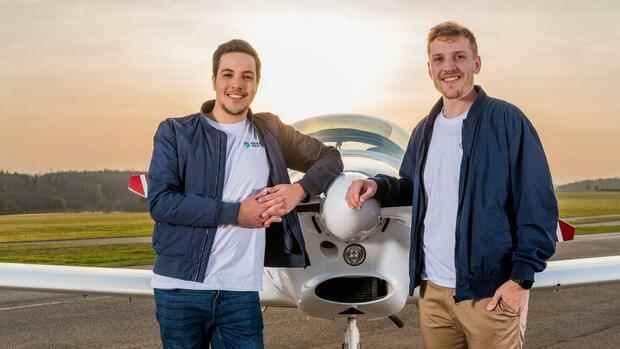The founders want to make the market for machine spare parts more transparent with their Marktpilot platform.
(Photo: Market Pilot)
Stuttgart Founding exactly at the beginning of the Covid pandemic two years ago does not have to be a disadvantage. And even the bottlenecks for machine builders caused by the Ukraine war could boost the business model. This is shown by the example of market pilot: The founders Tobias Rieker and Amin Oumhamdi have now received initial financing of 6.2 million euros from Cologne-based venture capitalist Capnamic, as they confirm to the Handelsblatt.
Capnamic’s investments to date include several start-ups valued in the billions, such as Staffbase or Lean IX. The founders do not want to say exactly what share of the company the young entrepreneurs are giving up. The business is to be set up in the USA, among other places, with the money.
Marktpilot wants to make the market for machine spare parts more transparent with its platform. In Germany alone there are over 65 million different spare parts and more than 8000 possible sources of supply in mechanical engineering. To do this, the software platform determines the current market prices, delivery times and availability using fully automated and AI-supported software technology.
In technical jargon, it is a Software-as-a-Service (SaaS) solution. Companies can use it to automatically research their entire spare parts portfolio in a previously non-transparent market.
Top jobs of the day
Find the best jobs now and
be notified by email.
Information from tens of thousands of national and international sources flows in. With its system, the start-up promises machine builders more stable customer relationships and more resilience in times of crisis.
Many machine builders buy large quantities of parts for their service business and pass them on to their customers at a cost-based surcharge. There is no market orientation whatsoever, explains Rieker. “Surprisingly, the machine builder then often sells the parts to his customers more cheaply than other providers on the market,” says the 27-year-old.
Sales and profit opportunities with 90 percent of the spare parts
With the information from Marktpilot, the machine builder can recognize his respective price position, react to it and adjust his prices. According to Rieker, an average of 90 percent of spare parts hide sales and profit opportunities.
“The identified potential creates measurable transparency in sales and procurement,” confirms Gerd Schöllhammer, service director of the machine tool manufacturer Heller, according to the announcement. The company with 2,500 employees was able to use the software to calculate more market-oriented and fair spare parts prices in a very short time.
The idea, which came up in 2016 before the company was founded, seems to be working. At the time, the industrial engineer Rieker was working for a large Stuttgart group and noticed that even the company did not have the spare parts market in its mechanical engineering division under control.
Crises like Corona now seem to be boosting business. “Customers got used to digital customer contact via teams and zoom in a short time,” reports Rieker. “The first on-site customer visit, which used to be essential, was no longer necessary. At the same time, our sales team was able to reach many more customers digitally,” reports Rieker, “so we were able to grow faster than planned.”
70 renowned customers
Two years after it was founded, well-known companies such as Claas, Krones and Homag are among the more than 70 corporate customers. The young workforce of more than 50 employees sit tightly packed in front of the screens on a 200 square meter floor in a listed building in Esslingen. “Many, like us, come from Esslingen University,” says Rieker.
The young Swabian entrepreneur wants to prove that you don’t have to be in a big city to set up a start-up. Rieker is as down-to-earth as its business model in mechanical engineering.
His 25-year-old co-founder Oumhamdi brings a bit of Facebook flair with him when he comes by with a friendly smile, in the style of the Adilette fan Mark Zuckerberg, in socks and slippers with the market pilot logo: “We are one of the fastest growing B2B start-ups -ups in Germany,” says the head of technology and the man behind the software with self-confidence.
The war in Ukraine could even have a positive effect on business: for many machine builders who are highly dependent on Ukraine and Russia, the supply chains, which are already stressed by shortages of raw materials and chip bottlenecks, are likely to be even more at risk.
After all, eleven percent of all supply relationships with Russia and the Ukraine relate to mechanical engineering. There will be no new business in the regions for the foreseeable future. Service and maintenance are therefore becoming even more important. According to the industry association VDMA, machine builders already achieve an average of more than 50 percent of the contribution margin. Service is already considered more profitable than new business.
Rieker is convinced that in this bottleneck situation, precise knowledge of the market situation becomes even more important in order to assess the availability of spare parts and, if possible, to coordinate storage accordingly.
More: How two ex-Porsche engineers want to revolutionize spare parts management
